Japan’s global car and truck manufacturers Isuzu Motors Limited, (Isuzu), Hino Motors, Ltd. (Hino), and Toyota Motor Corporation (Toyota) jointly announced on March 24 they have agreed on a new partnership in commercial vehicles tackling the future of mobility that will address environmental concerns.
Isuzu Motors Limited President Masanori Katayama, Toyota Motor Corporation President Akio Toyoda and Hino Motors Ltd. President & CEO Yoshio Shimo jointly held a live streamed press conference in Tokyo about their firms’ historic partnership.
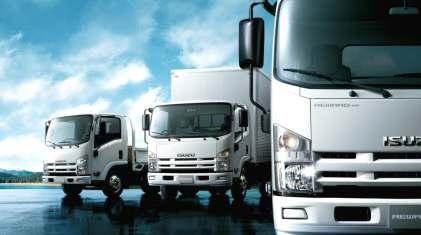 The companies said they have agreed to combine Toyota’s CASE technologies with the commercial vehicle foundations cultivated by Isuzu and Hino. Through this collaboration, they aim to accelerate societal implementation and dissemination of CASE technologies and services and to help address various difficulties facing the transportation industry as well as help achieve a carbon-neutral society.
The companies said they have agreed to combine Toyota’s CASE technologies with the commercial vehicle foundations cultivated by Isuzu and Hino. Through this collaboration, they aim to accelerate societal implementation and dissemination of CASE technologies and services and to help address various difficulties facing the transportation industry as well as help achieve a carbon-neutral society.
Specifically, the three companies plan to jointly work on the development of battery electric vehicles (BEVs) and fuel cell electric vehicles (FCEVs), autonomous driving technologies, and electronic platforms centered on the domain of small commercial-purpose trucks.
While working together on BEVs and FCEVs to reduce vehicle costs, the three companies plan to advance infrastructure-coordinated societal implementation, such as by introducing FCEV trucks to hydrogen-based society demonstrations in Japan’s Fukushima Prefecture, and accelerate their dissemination initiatives.
Connected tech platforms
Isuzu, Hino, and Toyota also plan to link their connected technology platforms to build a platform for commercial vehicles that can help solve customers’ problems. Through this platform, they intend to provide various logistics solutions that not only help improve commercial vehicle transport efficiencies but also contribute to reducing CO2 emissions.
To promote their partnership, Isuzu, Hino, and Toyota are establishing Commercial Japan Partnership Technologies Corporation, a company for planning CASE technologies and services for commercial vehicles based on discussions among its three parent companies.
Going forward, Isuzu, Hino, and Toyota intend to deepen their collaboration while openly considering cooperation with other like-minded partners.
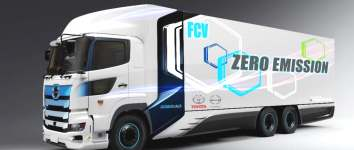 Capital partnership between Isuzu and Toyota
Capital partnership between Isuzu and Toyota
To smoothly construct and advance the collaboration announced today, Isuzu and Toyota have agreed on a capital partnership.
By way of Isuzu’s cancellation of treasury stock through a third-party allotment, Toyota is scheduled to acquire 39 million shares of Isuzu common stock worth a total of 42.8 billion yen (resulting in Toyota having 4.6 percent ownership of Isuzu in terms of total issued shares as of the end of September 2020 and a post-allotment voting rights ratio at Isuzu of 5.02 percent).
Isuzu plans to acquire Toyota shares of the same value through a market purchase.
Partnership background
With the CASE revolution, as the automobile industry enters a once-in-a-century period of profound transformation, Isuzu and Hino have been working on responses to CASE that match the unique characteristics of commercial vehicles, with a focus on electrification and connected technologies & services.
Toyota has been accelerating upfront investment in CASE technology and establishing partners with the aim of transforming into a mobility company. In the area of vehicle electrification, it has been engaging in all-around technological development and advancing vehicle electrification through the dissemination of hybrid electric vehicles and the early commercialization of FCEVs, among other initiatives.
To promote the reduction of CO2 emissions toward the Japanese government’s goal set last year of achieving a carbon-neutral society by 2050, the significance of electrifying both passenger and commercial vehicles in a way that responds to the energy situation in each region will grow more important than ever, as will the significance of energy-saving technologies.
Also, with the progress of digitalization, expectations are increasing for new services that make people’s lives safer, securer, and happier by linking vehicle data and various types of information.
CASE technologies can only contribute to society once they become widespread. Commercial vehicles can play important roles in dissemination, as they travel long distances for extended periods of time to support the economy and society and can be easily linked with infrastructure development. And from the standpoint of carbon neutrality, commercial vehicles can especially fulfill a key function.
In the transportation industry where commercial vehicles are used to support the movement of people and goods, expectations are that the power of CASE, centered on connected technologies and services, will deliver improvements in addressing transport inefficiencies, driver shortages, long working hours, and other issues facing the industry.
Solving these kinds of social issues is not something that one company can accomplish alone. It is necessary to seek a wide range of like-minded counterparts, apply their different strengths, and work together for those supporting transportation and for society.
Considering this situation, Isuzu, Hino, and Toyota have come to believe that Isuzu and Hino must cooperate in promoting CASE support for commercial vehicles and that Toyota must accelerate the societal implementation of its CASE technologies through the commercial vehicle businesses of Isuzu and Hino. Source: Isuzu, Toyota & Hino newsrooms
CEOs agree collaboration is key to building a better future
Fiercely rival companies traditionally don’t collaborate on projects for proprietary reasons. But these days, collaboration has emerged as the more practical option to achieve common goals for the greater good of mankind.
With climate change fast impacting how we live and so many natural disasters occurring at abnormal pace destroying everything in their paths, so much is at stake if major stakeholders like those in the global industry don’t do their part to help save the planet.
Climate-related disasters have cost the world roughly $650 billion from 2016-2018, according to Morgan Stanley. Over recent years, global warming and climate change had caused more destructions, droughts, wildfires, floods, diseases and displacement of people.
Here’s what the CEOs of Isuzu Motors Limited, Toyota Motor Corporation and Hino Motors Ltd. think about their landmark partnership. (Text & Photos from Toyota Times)
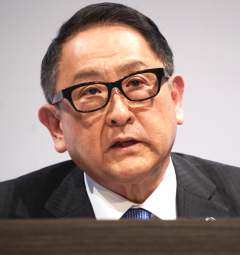 Toyota Motor Corporation President Akio Toyoda
Toyota Motor Corporation President Akio Toyoda
To build an ever-better mobility society, it is becoming more important not to only compete but to also cooperate. This partnership could not be realized even if any one of our three companies were missing. By utilizing the strengths of our three companies, I think we can help many of our transportation colleagues on site.
This desire to help will also be linked to our hopes for the reconstruction of Tohoku. Since the Great East Japan Earthquake, I have visited Tohoku every year in March. That’s because I have thought all along that what I can do is never forget about the disaster.
This year marks the 10th anniversary of the earthquake disaster, so I was wondering which site I should visit. As I was thinking about it, I was given an opportunity to visit the town of Namie in Fukushima Prefecture, which is advancing initiatives for the future.
On-site, I was able to talk with Fukushima Governor Uchibori and Namie Mayor Yoshida about their thoughts on reconstruction. One project has advanced since then.
Isuzu and Hino fuel cell trucks are carrying goods using green hydrogen produced in the town of Namie. cAnd we will contribute to the realization of uniform, waste-free delivery by linking “make”, “transport”, and “use,” using connected technology.
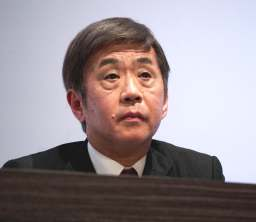 Isuzu Motors Limited President Masanori Katayama
Isuzu Motors Limited President Masanori Katayama
Of course, Hino is our biggest rival, and we are fighting it out with them every day all over the world. That will never change. However, at the root of our competition is a common desire to improve logistics and society.
Also, although Toyota is a passenger car manufacturer, there is no difference between passenger cars and commercial vehicles when it comes to Toyota’s desire to make society and Japan better. Toyota is a company that has brought about a seemingly uncountable number of innovations since its inception. In terms of manufacturing, there is the Toyota Production System, and in terms of electrification, there are hybrid vehicles and fuel cell hybrid vehicles.
Hino knows commercial vehicles best. Toyota has a huge amount of technology and a powerful ability to execute, both of which have a high potential for playing a role in small commercial vehicles.
We have concluded that if our three companies work together, we will be able to innovate to overcome the rough seas of CASE and provide our customers with light-duty trucks—solutions—that are even more useful.
However, through our new partnership, our three companies will jointly work on the battery electrification and fuel cell electrification of light-duty trucks, reducing vehicle costs, and, at the same time, we will work with society and our customers to promote BEVs and FCEVs in earnest, including through societal implementation in Fukushima Prefecture.
Increases in distribution volumes are leading to labor shortages. Redelivery and busy cargo handling are increasing driver burden. And the advance of digitalization has created new and growing transportation needs. To respond to these and other issues, we must respond to the profound transformation of industry in this age of digitalization.
The lean and efficient movement of trucks can contribute to achieving carbon neutrality. And connected technologies hold the key.
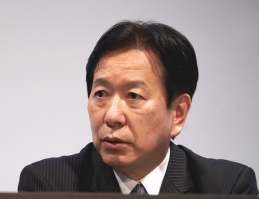 Hino Motors Ltd. President & CEO Yoshio Shimo
Hino Motors Ltd. President & CEO Yoshio Shimo
Today there are over 60,000 logistics companies operating in Japan. Every day these companies load, haul and deliver cargo. It’s hard work, yet everyone involved in overland shipping takes great care with each and every package, determined to deliver it surely to each waiting recipient.
At Hino Motors, we share the perspective of our customers working at the heart of the lifeline that is overland shipping and are working hard to solve a slate of problems. But the environment enfolding the logistics industry is unforgiving. If things continue as they are, the day may come when those packages stop being delivered.
One issue is a shortage of drivers. The reason is that nobody is willing to take the job. Driving trucks is a tough way to earn a living. The risk of traffic accidents is ever-present, the hours are long and it involves a lot of work besides driving.
Long-haul drivers often spend as much time on work other than driving as they do on driving. Sometimes even more.
By coordinating with each other in a connected manner, companies can reduce waiting times and improve loading efficiency. This partnership will also make it possible for more and more operators to adopt electric trucks.
Moreover, as these solutions make progress, we can expect work in overland shipping to become more attractive, so that the number of drivers and others involved in logistics will grow.
Nearly 22 million packages are delivered by UPS across 220 countries every day. Its operation is so massive that it requires employing more than 540,000 people across the world and deploying about 2,285 flights each day at different strategic airports.
The company which was first opened in 1907 in a Seattle, Washington basement by two teenage entrepreneurs, Claude Ryan and Jim Casey, with just a $100 loan and named as the American Messenger Company, is now the world’s largest package delivery service.
Supporting its operations are more than 12,000 alternative fuel and advanced technology vehicles deployed worldwide.
And with the world embracing more innovation and policies to help stave off the devastating impact of climate change, UPS is exploring more ingenious options in saving the planet, time and resources in carrying out its job.
BETA’s eVTOL
UPS or United Parcel Service announced it is buying dozens of electric vertical takeoff and landing (eVTOL) aircraft from Beta Technologies (BETA) as part of its innovation-driven strategy to identify new ways to help small businesses with sustainable solutions.
Under their agreement, BETA will first design and build 10 of its Alia-250 eVTOLs due for delivery to UPS by 2024, pending approval from the US Federal Aviation Administration. UPS has the option to buy up to 150 of this model.
BETA sees its agreement with UPS as a major milestone in the future of eVTOL in the commercial global aviation and logistics market.
Powered by an electric batter, this plane can carry 1,400 pounds and can travel up to 250 miles at 170 mph once fully charged with zero emissions.
“This is all about innovation with a focus on returns for our business, our customers and the environment,” said Juan Perez, UPS chief information and engineering officer. “These new aircraft will create operational efficiencies in our business, open possibilities for new services and serve as a foundation for future solutions to reduce the emissions profile of our air and ground operation.”
With the capability to take off and land directly on UPS property, eVTOL aircraft are perfect for moving smaller loads that would otherwise fly to and from airports on small feeder aircraft or take even longer by ground.
UPS has reserved BETA’s recharging station for safe and rapid charging of the aircraft in under one hour to facilitate faster cargo loading and unloading. The charging station also offers the aircraft’s batteries a second life. After the batteries’ first lifecycle in the aircraft is over, they can be fitted to the charging station to recharge the aircraft’s onboard batteries as well as UPS’s fleet of electric ground vehicles.
Fernhay eQuad to debut at Expo 2020 Dubai
As the official logistics partner of Expo 2020 Dubai (1 October 2021 to 31 March 2022), UPS said it will show how rethinking logistics and sustainability is good for both business and the world by highlighting its sustainable urban delivery vehicles.
This includes the debut of the Fernhay eQuad. Less than three feet wide, the four-wheeled electric-assist cycle is catering to complex urban deliveries allowing the driver to easily move through congested narrow streets and to pedal in bike/cycle lanes.
“The eQuads are specifically designed with changes in urban delivery in mind,” said Luke Wake, vice president of maintenance and engineering. “Many cities around the world not only have more pedestrian areas but are also growing fast, resulting in more package deliveries in busy areas inaccessible to larger vehicles. The eQuad is a solution that can deliver throughout cities reducing noise, emissions and congestion.”
The eQuad started its journey in the U.K. and made stops in France and Germany, before arriving in the UAE, where it will be showcased at Expo 2020 Dubai. This new vehicle builds on UPS’s growing fleet of sustainable delivery solutions that improves air quality, decreases congestion and reduces emissions.
UPS’s use of eQuads complements its three-wheeled Rytle eBikes which will also be showcased during the expo and are perfect for navigating dense urban areas.
UPS will also feature its futuristic Arrival EVs. Developed in partnership with U.K.-based transportation technology firm Arrival, these vehicles use state-of-art charging technology to provide more than 150 miles of travel on a single charge – a longer range than other vehicles.
“We are very excited to have these great technologies at Expo 2020,” said Alan Williams, vice president, Expo 2020 sponsorships and operations. “We have a unique opportunity to showcase innovation and our sustainable logistics that will take us into the future.”
This pandemic has created an era of unprecedented disruptions and uncertainties colliding with possibilities and innovative solutions never before seen in history which many hope will lead to better times.
While uncertainties are still very much felt anywhere with poverty and unemployment rising, more than 135 million infected with COVID-19 virus and related deaths rising to nearly 3 million worldwide, new possibilities and opportunities are also abundant.
There are the mRNA COVID-19 vaccines that took less than a year to develop instead of years had traditional methods been used, virtual work and business, social distancing, the rise of touchless & contactless buying thru e-commerce, use of passenger planes for air cargo, ebooking on air cargo and trucking, digitalization in the manufacturing industry and so on.
And while the global recession lingers on due to the pandemic, some industries like air cargo remains dynamic, agile and growing.
 With most passenger flights still grounded, air cargo felt the pinch with the loss of belly capacity. However, the rise in demand for air flown goods, particularly vital medical supplies and vaccines, offset this with cargo yields estimated to be up more than 40 percent and performance varying widely by carrier.
With most passenger flights still grounded, air cargo felt the pinch with the loss of belly capacity. However, the rise in demand for air flown goods, particularly vital medical supplies and vaccines, offset this with cargo yields estimated to be up more than 40 percent and performance varying widely by carrier.
Air cargo airlines with dedicated freighter fleets, especially those with express and charter flights, have seen the most growth in cargo volumes and revenues.
ECS Group & CMA CGM Air Cargo
ECS Group, the leading global GSA company, is among those that broke new grounds amid the air cargo industry’s rise in these challenging times.
The Group has forged new partnerships in different regions and airlines, including new players in the industry like CMA CGM Air Cargo, the newly-formed air cargo carrier by global French shipping line CMA CGM Group.
Adrien Thominet, ECS Group CEO, told Air Cargo Update, he’s very much delighted with their new partnership which he sees to grow further in the future.
“The CMA CGM Group’s decision to open an air cargo division is in keeping with their development strategy and their desire to diversify the freight offering available to their clients. Some of these clients require fast transport, particularly in the luxury and tech sectors. Demand is high, and with the slowdown in passenger activity, hold capacity has dropped significantly,” said Thominet.
CMA CGM Air Cargo has initially commissioned 4 cargo aircraft and recently launched its 10 weekly flights between Liege and Chicago.
“This is excellent news for the industry, with new opportunities for forwarders in this highly dynamic sector and a more diversified offering with multimodal solutions. Our teams at ECS Group sell the CMA CGM group’s capacity on its behalf, and the aircraft are full. It’s a very good sign for things to come and we firmly believe that their aggressive strategy of development in the air cargo sector will soon enable them to become a key player in our industry,” said Thominet.
The ECS CEO said sales are strong for CMA CGM Air Cargo and the industry has quickly warmed up with the new airline.
“Our partnership has got off to an excellent start – sales are strong and it’s been very well received by the industry. Over the coming weeks, our partnership will accelerate even further with the arrival of two additional A330 aircraft that would serve the Middle East. Our goal is to work together to create a global network – that’s what we’re currently working on with the CMA CGM group, while also taking optimizations to the A330s into account,” he said.
“In my view, this is a very promising partnership, with many developments still to come. Our expertise is complementary, our networks are complementary, and we will be able to create a whole host of opportunities as a result,” he added.
While challenges are still there, Thominet expressed confidence the new airline will pivot its way to success saying, “There are a number of challenges to overcome, but we’re already overcoming them thanks to our joint effort. Firstly, CMA CGM is a newcomer to air cargo, and so it needs to find its place. But as I said earlier, capacity is selling very well and we have used all of our expertise and our entire network to support our client by promoting and marketing their capacity.
“What’s more, I think that CMA CGM Air Cargo has arrived at the perfect moment – there is real demand and the reception it’s been given couldn’t be better. Other challenges include creating connectivity within the network to develop supply, create new segments, and ultimately succeed in developing a multimodal approach. It’s a longer-term, multi-step process, but I’m convinced that we’ll get there.”
2020: An Unusual Year
2020 was probably one of the most difficult year for many people and companies, including ECS which represents hundreds of companies in over 50 countries through its 167 offices worldwide.
Thominet described 2020 as both “difficult and unusual” that brought unprecedented challenges and growth at the same time.
“It was a difficult and unusual year for us as well, but overall, I would say that we withstood the crisis better than the market (which recorded a 35% decrease in volume and a 30% increase in revenue). There are many challenges as a result of uncertainty, market fluctuations and new ways of working (both within the group and with our clients and partners),” he said.
“What enabled us to better withstand the crisis was first and foremost our expertise, our ability to adapt and our capacity to offer solutions to our clients. This meant we were very quickly able to offer our clients new outsourcing solutions so they could optimize their costs and revenues to the greatest possible extent. And above all, with our main partners, we focused heavily on preighter operations and charter activity, putting these operations in place – sometimes from A to Z – in record time,” he further explained.
The ECS CEO said the biggest change occurred at their organizational level with remote working quickly adapted for safety reason while keeping up their services with their clients.
“The reorganization was needed to enable us to continue to offer new business solutions to our clients, such as data capture, for example, as well as management of all ops aspects (including Quality, Safety and Security) and solutions to respond to the growth in e-commerce (GSA Mail Solutions) which developed even further with the pandemic.
 “All of this allowed us to take the initiative and offer our clients a wide range of solutions to increase their revenue and/or reduce their fixed costs, which are crucial in light of the current situation,” he said and praised their teams at different parts of the world. “I’d also like to pay tribute to the exceptional work of the groups’ teams and the solidarity they have shown – these two factors clearly made all the difference.”
“All of this allowed us to take the initiative and offer our clients a wide range of solutions to increase their revenue and/or reduce their fixed costs, which are crucial in light of the current situation,” he said and praised their teams at different parts of the world. “I’d also like to pay tribute to the exceptional work of the groups’ teams and the solidarity they have shown – these two factors clearly made all the difference.”
Optimism in the new normal
The global economic collapse caused by the pandemic is so massive experts believe it would take years before recovery can be reached. Vaccine distribution delays, new virus variants that are more spreadable and resistant to vaccine, market fluctuations, political uncertainties and other external factors could also impact how fast global economic recovery can be realized.
And certain frontline industries like healthcare, airfreight, among others, need to be strong to support lives, livelihood and businesses.
Thominet said he remains optimistic about the future despite uncertainties with many opting to adapt rather than be defeated by an invisible enemy.
“My vision continues to be an optimistic one because the industry has shown just how capable it is of quickly reorganizing and adapting to a sudden change in the situation. Despite everything, there are still many difficulties to overcome because uncertainties surrounding the months ahead remain, and many airlines are in a difficult position given the absence of passenger flights,” he said.
“I think that we’ll also see new stakeholders emerge in our industry, many of which will be linked to the e-commerce boom, to new-found awareness of air freight, and of course to the acceleration of digitalization within our industry,” he added.
Accelerated Digitalization
ECS is among major companies that have prioritized digitalization long before the pandemic highlighted the need to transition to smart technologies.
Its investment is paying off and the company is convinced it must sustain this move to keep up with the changing times and new technological trends in the era of the Fourth Industrial Revolution.
“Yes, we have continued with – and even accelerated – our digitalization by continuing to invest despite the crisis. The idea is that digital transformation within the industry is in its infancy, that it will be one of the keys to recovery, and that demand is growing in the sector. As digitalization is destined to increase and service providers will undoubtedly become stronger (as happened on the passenger side), we thought it was essential to be ready for the next steps. This is the reality, and we are ready,” Thominet said.
“We’re also convinced that by doing this, we will get through the crisis more easily. We’re able to improve yield management thanks to our in-house business intelligence tool (Apollo); boost our responsiveness, performance and reliability by optimizing processes; continue to train our employees all over the world thanks to our e-learning platform (Discovery); and increase our clients’ visibility via partnerships with the main e-booking sites,” he added.
While air cargo is keeping up with the demands of the times, Thominet opined it needs to step up efforts to embrace digitalization.
“The industry needs to make up for lost time and go fully digital. I think that for many, the crisis has revealed just how necessary this is. We support our clients in this field and this makes us the GSA that offers the greatest range of advanced digital solutions. Without giving an exhaustive list, the main tools we’ve developed in-house are: Apollo: business intelligence and reporting system; Quantum: quotation tool supporting the ad-hoc pricing process; Discovery: internal e-learning platform; Pathfinder: shipment tracking system,” he said. “We also use the best technologies and tools available on the market, for example by working with the main e-booking platforms, as well as Wiremind and Skypallet, which help to optimize loads.”
Global Partner
The pandemic has no doubt exposed both vulnerabilities and strengths of different economies and industries like aviation and healthcare. Many have fallen and others remain struggling.
Air cargo, on the other hand, has shown its remarkable strength and agility in the face of adversity but Thominet said there’s no time for complacency.
“Air cargo has shown just how indispensable it is in keeping the global economy running and providing rapid support to people worldwide. It has demonstrated an impressive level of responsiveness and the hard work of the industry’s teams has been recognized the world over, so much so that if another event such as this were to happen, the sector would be ready. That said, the pandemic has also weakened many stakeholders and the market needs to do all it can to self-regulate. It’s essential that sufficient yields are reached to allow airlines to continue their growth. Our industry itself must offer and provide solutions for a sustainable recovery. It’s up to our industry to shape its future,” he said.
And as the head of ECS Group which breathes life to dozens of cargo carriers across the world, Thominet said finding solutions is crucial to the business.
“And at ECS Group, that’s exactly what we’re doing – we’re constantly creating new solutions that are adapted to the circumstances and emerging needs of our clients. This way, we enable airlines to outsource more of their costs, but also to develop new income-generating activities. All of these solutions are of course entirely bespoke, recognizing the fact that each airline has its own unique needs,” he said.
Global trade has resumed albeit far from the pre-pandemic pace it’s accustomed to. The airfreight industry, which accounts for more than $6 trillion of goods traded worldwide annually, is there to ramp things up.
Thominet said one of the valuable lessons he learned in this pandemic is that expertise and human analysis are still, by far, our best tools, to rise above our challenges.
“One of the lessons I’ve learned is that in a time of crisis or when faced with an uncontrollable and unforeseeable new situation, expertise and human analysis are by far our best tools to emerge from it. The air cargo industry has demonstrated its ability to transform itself during the pandemic and to take the reins to offer transport solutions in response to the drastic fall in passenger flights and hold capacity. Pre-pandemic, cargo made up 5-10% of airlines’ revenue.
“Today, though, it accounts for 30% of their income. This makes it a powerful economic driver for them. As a result, it needs to be supported and championed so it can continue to play its role as a driving force for airlines but also more broadly for global trade,” he concluded.
Working in the airline industry is not just a job for Nabil Sultan but the fulfilment of an inner calling. The newly appointed Divisional Senior Vice-President of Emirates SkyCargo, speaks to Chandrima Dutta about the direction in which he wants to lead, challenges and his next steps in overall expansion of the company
In 1990, Nabil Sultan chose to be part of an airline that was hardly 5 years in business. Since then Dubai based Emirates has evolved into a globally influential travel and tourism conglomerate.
Steadily rising through the ranks, he had a constantly evolving function as the airline grew from infancy and meandered into an established multi-level organisation.
His career within Emirates spans more than 20 years. He began in 1990 in the IT department, and two years later joined the company’s management training programme with the Commercial department. Between 1995 and 2008, he worked in various management and leadership roles both within and outside the U.A.E, including being Senior Vice President for Commercial Operations West Asia and Indian Ocean, Senior Vice President, Commercial Operations Gulf, Middle East and Iran, and Senior Vice-President, Commercial Operations for Europe. In 2009, he was promoted to Divisional Senior Vice President, Revenue Optimisation and Distribution.
 This year, he took over as head of Emirates SkyCargo from Ram Menen. A modest Sultan says, “I’m excited by the opportunity to further develop and expand the cargo division, building on the success it has achieved to date. Emirates SkyCargo will continue to focus on providing our customers with excellent service, the development of innovative products and services and building our global network and freighter operation.”
This year, he took over as head of Emirates SkyCargo from Ram Menen. A modest Sultan says, “I’m excited by the opportunity to further develop and expand the cargo division, building on the success it has achieved to date. Emirates SkyCargo will continue to focus on providing our customers with excellent service, the development of innovative products and services and building our global network and freighter operation.”
However, as we all know ‘change is never easy’ – Sultan has a mammoth task ahead, that of coping with the division’s rapid growth, a fast evolving business and stiff international competition.
Since his promotion, he has worked tirelessly to achieve his immediate objectives and focussed on SkyCargo’s long-term vision. The fact that he has been in the business for the past 2 decades has helped Sultan understand the tricks of his trade too well – he knows how to sustain and manage a company’s reputation, “one needs to set out a clear vision that combines commercial targets and the company’s values & relationships,” he says.
Below is an excerpt from the interview:
How have the first few months been in your new role?
So far it has been a seamless transition, and uninterrupted day to-day running of the business. However, the first few months on the job have been extremely busy and are fundamental for long-term success.
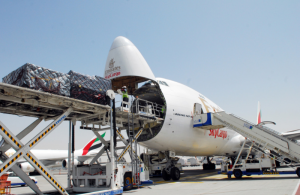 What are your short and long-term goals?
What are your short and long-term goals?
My priorities during this initial stage are to establish clear direction, continue to deliver first-class services to existing clients, provide leadership to employees, strengthen our relations with all existing and potential clients and manage our costs effectively.
My long-term goals are to grow our existing business and to secure new sustainable long-term business, improving financial results, add to our global presence, and finally perform at the highest level of industry standards. I also aim to provide a unique and highly competitive level of services by developing our exceptionally skilled, efficient, flexible and multi-skilled employees.
What is your next step in Emirates SkyCargo’s overall expansion and growth programme?
The planned move of our freighter operations from Dubai International Airport to Dubai World Central Al Maktoum International Airport is the next step in Emirates SkyCargo’ s overall expansion and growth programme. It provides us with a brand new facility for our freighter operations and will increase capacity and enable us to meet our long-term objectives.
While the site is being developed, it remains business as usual for us. We are working very closely with Dubai Airports to ensure a smooth transition of our freighter operations. The move does not include passenger fleet belly cargo operations which will continue to operate from Dubai International Airport.
The terminal will have an initial capacity to manage 700 000 tonnes of cargo per annum, which can be expanded to meet future growth. It also provides Emirates SkyCargo with the space to have a larger perishables handling area, with a dedicated pharmaceutical storage area, enabling it to expand its cool chain products and services.
In addition to the cargo terminal, various facilities and infrastructure will be built including 46 truck docks and 80 truck parking spaces, 12 aircraft stands directly in front of the terminal, while additional interface facilities – east and west cross docks will be built at Dubai International Airport.
In general, how strong is the air cargo market in the Middle East?
The Middle East cargo market is buoyant with on-going investment in expansion by regional players supporting the continued flow of cargo volumes both into and through the key markets in the Middle East. In the GCC the infrastructure developments continue to drive the need for materials and supporting logistics, this is particularly noticeable in the UAE, Saudi Arabia and Qatar. The continued expansion and development of airport facilities across the region is also driving growth, once again particularly in those countries mentioned, including Oman and Jordan as well as the long term opportunities that will be seen in Iraq. A thriving and growing consumer society with spare capital to invest and spend on luxury items as well as more standard consumable items, a growing tourist industry whose expenditure on perishable goods when staying at the growing number of hotels will continue to drive demand for food items being moved into the region by air. All signs point to on-going positive momentum for growth.
Plus, latest figures released by IATA show, Middle Eastern airlines are experiencing a continued robust expansion of demand with freight volumes growing by 12.7% year-on-year whereas globally airfreight demand has expanded only 1.2%.
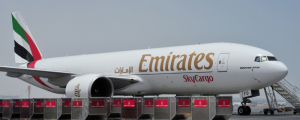 How has Emirates SkyCargo performed?
How has Emirates SkyCargo performed?
Defying the industry trend, the 2012-13 financial year has been a strong one for Emirates SkyCargo who for the first time reported a revenue over AED 10 billion reaching AED 10.3 billion (US$ 2.8 billion) mark, an 8 per cent increase over last year.
Emirates SkyCargo’s tonnage increased 16 per cent reaching a remarkable 2.1 million tonnes in a shrinking airfreight market, highlighting its ability to grow revenues against the industry norm. This year, freight yield per Freight TonneKilometre (FTKM) decreased by 6 per cent.
Contributing 15 per cent of Emirates’ total transport revenue Emirate SkyCargo continues to play an integral role in the company’s expanding operations.
At the end of the financial year, Emirates SkyCargo freighter fleet totalled 10 aircraft – eight on operating lease and two on wet lease.
Do you feel that emerging markets, particularly India and China are key to your growth strategy?
I believe the future lies in the growth potential of emerging markets such as India and China. For us, both countries remain strong areas of opportunities as we look to expand globally.
Both countries have tremendous potential for investors; India has the advantage of language whereas China has a
disciplined labour force.
Discuss some of the challenges the air cargo industry faces this year?
The international air cargo industry is struggling under the weight of a serious issue: overcapacity. Air freight has encountered severe headwinds as the eurozone fiscal crisis and middling economic recovery in the U.S. put pressure on demand for exports out of Asia, especially China. The exceptions, of course, are high-value products such as Apple iPhones and iPads that tend to create temporary spikes in volume and underpin the industry.
In addition, high fuel costs affect the bottom line of everything, and the impact on our industry cannot be overstated.
Do you feel 2013 is going to be a better year?
Prospects are encouraging for strengthened economies over the course of 2013 and 2014. As far as our industry is concerned, growth is expected to moderately strengthen in 2013, supporting the positive outlook for continued long-term world air cargo traffic growth.
For Dubai and Emirates SkyCargo the good news continues: we have seen incredible growth over the years and we anticipate the same going forward.
New upcycling company, PLANE SOUQ is bringing retired aircraft parts back to life.
PLANE SOUQ is designed to be an online marketplace for upcycled aircraft parts.
Developed by aviation entrepreneur and owner of the Albion Aviation Group Lewis King, the PLANE SOUQ marketplace responds directly to an increased interest and demand in up-cycled aviation memorabilia, such as aircraft skin tags, repurposed aircraft windows, galley trollies and seats.
“The aircraft teardown and upcycling market has always intrigued me and with an acceleration of aircraft retirements due to COVID-19, we want to try and preserve some of these iconic aircraft before they are lost forever,” said King.
“For any aircraft graveyards or teardown companies reading this article, please get in touch as we want your scrap!”
PLANE SOUQ’s launch skin tag is the limited edition “Queen of the Skies”, which has been cut from the tail of British Airways B747 aircraft G-CIVI or otherwise known as the “City of Gloucester” or “Victor India”. The tags are designed and made in the UK, but are available for worldwide shipping.
PLANE SOUQ has also partnered with UK based aviation charity The Air League and for every tag sold by PLANE SOUQ, a donation will be made to the charity. The Air League is an aerospace charity with a vision focused on changing lives through aviation.
Recognizing the importance of developing air cargo supply chains to handle and transport pharmaceuticals, especially for the last mile delivery, in humanitarian contexts or in crisis situations, Pharma.Aero and HLA have established a formal basis of collaboration by signing a Memorandum of Understanding (MoU).
This collaboration will not only underline common interests between the two organizations, but also enable both organizations to combine forces in strategic projects that will improve quality in global air cargo industry, with a focus on crisis-prone countries, as well as emergencies and humanitarian projects.
Jeremy Mitchell, director of Pharma.Aero stresses the importance of this new collaboration: “By joining forces with HLA, we bring the Human Interest aspect into the Pharma.Aero network and platform. This will create more leverage and added value in all our undertakings as well as broaden our scope and impact when reaching out to the entire pharmaceutical air cargo supply chain.”
“HLA aims to increase understanding and forge alliances between aid organizations, the private, public and academic sectors,” adds George Fenton, chief executive of HLA. “The newly formed partnership with Pharma.Aero will enable us to add significant value to our network and gear up the effectiveness and efficiency of members by raising awareness of standards, facilitating access to training and career development opportunities, and encourage collaboration among a broader range of humanitarian logisticians.”
Trevor Caswell, vice chairman Pharma.Aero and responsible for Projects, points out that “both organizations share the same vision: being a neutral platform of international best-practice and knowledge sharing, and fostering community collaboration by trust. In setting up joint projects that emphasize the growing importance – both for the rapidly changing aid system as well as for the supply chain – of ‘local actors’ and ‘last mile’, we can create added value: to look at ways to improve reaching difficult places via UAV technology will be one of our first joint projects.”
Emirates has made its first A380 touchdown at Terminal 1 in Jeddah’s King Abdulaziz International Airport (KAIA), making it the first airline to operate the double-decker aircraft to the new airport. The flight was greeted with a water cannon salute.
For the inaugural A380 flight to the new terminal, Emirates deployed its latest aircraft featuring the premium economy seats, as well as signature enhancements across every cabin.
Mohammed Alnahari Alhashmi, VP, Commercial Operations, Kingdom of Saudi Arabia said: “Moving to Terminal 1 represents a significant improvement in the customer experience. Emirates’ customers will have access to world-class amenities, including restaurants, retail outlets, airport lounges and much more.
“We would like to thank the General Civil Aviation Authority, King Abdulaziz International Airport, and the local authorities who have been providing their support and working closely with us to make this move a success and ensure that Emirates’ passengers arriving and departing from Terminal 1 enjoy a seamless airport experience as well as best-in-class services.”
Through its passenger and cargo operations, Emirates has been supporting the Kingdom’s pandemic response. The airline has also stepped up to support Saudi’s international trade links and has also been instrumental in transporting critical medical supplies, vaccines, PPE, food, and other supplies into the Kingdom throughout the pandemic.
Antonov Airlines has transported essential pharmaceutical machinery from Germany to the USA, where it will be used for the production of COVID-19 vaccines.
The carrier safely operated six flights of the cargo from Frankfurt-Hahn Airport, Germany, to the USA – including Baltimore, Maryland, and Kinston Regional Jetport, North Carolina – with some flights having to navigate poor weather conditions in the USA caused by snowstorms.
Heavy snowfall across the USA meant a change in arrival airport for one of the flights from Baltimore to Stewart International Airport, New York, was required to ensure the safe delivery of the cargo.
Antonov Airlines used AN-124 planes, each with a payload of 150 tons, to carry the machinery, with each consignment weighing 100 tons.
The cargo was loaded and unloaded onto the AN-124s using external cranes and unique loading equipment that was developed by Antonov Airlines’ in-house engineers.
DHL Global Forwarding chartered the Ukrainian-headquartered carrier to undertake the moves.
“The flights were a great charter project that we carried out together with Antonov Airlines professionally and to the fullest customer satisfaction,” said Christopher Klein, Senior Manager Global Charters, DHL Global Forwarding.
“In the past few months there have been a number of challenges to master, most recently a snowstorm on the US east coast, which meant we had to change the destination airport at short notice.”
Dmytro Prosvirin, Head of Customer Service Department, Antsonov Airlines, said; “It is a global effort in the fight against the coronavirus pandemic and we are honored that Antonov Airlines played a key role in this.”
Worldwide Flight Services (WFS) has become the first cargo handler at Milan Malpensa Airport to be awarded Authorized Receiver status by Italy’s Customs authority.
The approval means freight forwarders can now clear and offload cargo directly at WFS’ cargo terminal at the airport, which offers significant time savings and productivity efficiencies.
Massimiliano Introini, Managing Director of WFS in Italy, said: “We are honored to have received Authorized Receiver status, which reflects our ability to meet all of the strict requirements of the Customs authority. As the world’s largest air cargo handler, WFS is continuing to grow its services at Milan-Malpensa and will continue to look for these types of opportunities which benefit both our airline clients and their freight forwarding customers.” WFS now handles 11 airline customers in Milan, including American Airlines, Asiana Airlines, Air Europa, China Eastern, China Cargo, Air Serbia, Ukraine International and BlueAir.
WFS opened a new 8,800 sq. mt. cargo handling terminal in Milan in 2018 capable of handling some 47,000 tons a year, and equipped with facilities to support customers’ premium products, such as a dedicated temperature-controlled cool zone for pharmaceutical shipments.
EZDubai, a fully dedicated e-commerce free zone strategically located in the heart of Dubai South’s Logistics District, is welcoming UDA Express, one of the largest express companies in China, that will be expanding its operations in the region by benefitting from EZDubai’s e-commerce, logistics facilities, bespoke business solutions, and reach to the high-growth markets of the Middle East, Africa and South Asia.
UDA Express, one of the world’s top freight-forwarding and logistics service providers, was founded in 1999. It controls 59 self-operated distribution centers in China across 3,835,000 square meters and more than 30,000 stores across 30 countries. Last year, UDA Express achieved a market share of 16.61% in the national express industry, whereas its market value reached $18.7 billion in the Shenzhen Stock Exchange.
In his comments, Mohsen Ahmad, CEO of the Logistics District at Dubai South, said: “We are pleased that UDA Express chose EZDubai as a home for its operations in the MENA region. In our pursuit to uncovering market trends, we work diligently to cater our solutions and facilities to meet our clients’ aspirations to allow them to develop and thrive in competitive markets. The setup of UDA Express will reiterate our prominent position in attracting international logistics and e-commerce players to conduct their businesses and boost the growth of the logistics sector locally and globally.”
Robert Zhang, President of UDA Express – Middle East and North Africa, said: “EZDubai’s strategic location, its advanced logistics facilities, optimal business solutions, and capabilities that cater to all sorts of companies will consolidate our objective of becoming the premier international logistics and express delivery service provider in the Middle East. We are confident that through our new expansion, the company will complete its networking in the Middle East and link up with our existing network in China, providing direct and efficient logistics solutions to customers in China and the Middle East.”
The 920,000 square-meter, purpose-built e-commerce hub is designed to attract the world’s leading e-commerce companies and create a benchmark with its infrastructure. The e-commerce zone, which was launched in January 2019 by HH Sheikh Mohammed bin Rashid Al Maktoum, Vice-President and Prime Minister of the UAE and Ruler of Dubai, aims to promote the emirate’s position as a hub for global e-commerce.